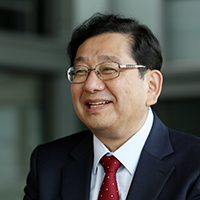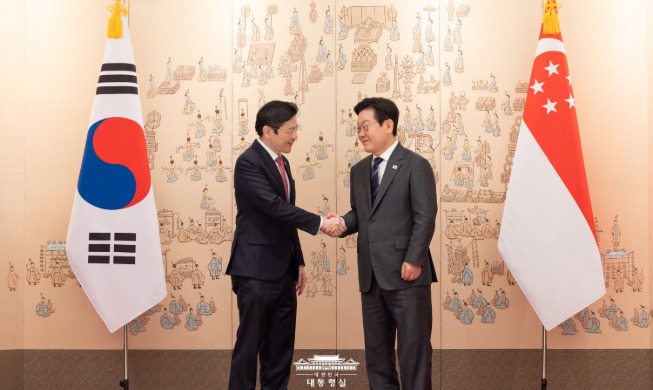| The following op-ed was written by Yuji Hosaka, a professor at Sejong University in Seoul, to help readers overseas better understand the reasons and the historical background behind the latest conflict between Korea and Japan. |

By Yuji Hosaka
Professor at Sejong University
History of bilateral relations at a glance
Korea and Japan have developed close relations since ancient times. According to academic research, a large number of Koreans went to Japan from the fourth century B.C. After the fall of Korea's Baekje Kingdom (18 B.C.-A.D. 660), one of three kingdoms on the Korean Peninsula in the seventh century, many Baekje people moved to Japan. As a result, 1 million to 2 million people from the peninsula moved to Japan. In the fourth century B.C., the number of indigenous people in Japan was an estimated 70,000, so it is no exaggeration to say ancient Japan was built by people who moved there from the peninsula. Thus many say Koreans and Japanese share a lot in common vis-a-vis their DNA than people elsewhere.
Afterwards, Japan achieved development by embracing advanced culture from the Korean Peninsula and China. From 920 A.D. to the early 1400s, however, Japan's relations with the peninsula and China were cut off. During that period, Japan formed a so-called warrior society while the Joseon Dynasty (1392–1910) was established on the peninsula led by literary scholars. In 1404, Joseon and Japan forged a diplomatic relationship after 500 years. Bilateral relations then developed smoothly but this relationship became severed after Japan began its so-called Warring States period (Sengoku Jidai) marked by social upheaval and military conflict within the country.
When Toyotomi Hideyoshi united Japan in the late 16th century, he set Joseon as his next target and sent a massive force of more than 200,000 troops to the Korean Peninsula. This was the start of Hideyoshi's ruthless invasions of Joseon that lasted seven years and greatly harmed relations between Joseon and Japan; these offensives are still remembered by Koreans as historical events that cause anti-Japanese sentiment in Korea even today. The invasions also halved the Joseon population, and many of the peninsula's cultural heritage and products flowed into Japan at the time.
After the Tokugawa shogunate (feudal military government) took power and accepted neo-Confucianism, which was the state philosophy of Joseon, both Joseon and Japan restored relations over the next 270 years. During that time, both sides maintained peaceful and friendly ties unprecedented in their history.
Yet bilateral relations underwent drastic change in the mid-19th century, when Western powers invaded China. In 1868, the reign of the Tokugawa shogunate ended and the pro-modernization Meiji era took over. The new regime set as its goal the invasion of the Korean Peninsula, believing that putting the territory under Japanese control would protect Japan from Western invasion and make the peninsula a foothold to enter the Asian continent. At the time, Russia was expanding its reach southwards, causing both the U.S. and the U.K. to fear Russian attempts to bolster its influence on the peninsula and in Japan. For this reason, Washington and London supported Tokyo, which resulted in Japan's colonization of the peninsula in 1910.
Japanese colonial rule of Korea lasted until 1945. Due to lingering issues that remained unresolved, Korea-Japan relations have repeatedly switched from friendship to conflict.
The 1965 Korea-Japan Claims Settlement Agreement and normalization of diplomatic relations
In 1965, Korea and Japan resolved the matter of the former's colonization of the latter and signed the Treaty on Basic Relations and four other accords. Among them, the Korea-Japan Claims Settlement Agreement continues to pose problems between both nations to this day.
Through the treaty, Seoul and Tokyo agreed that the right of an individual as well as a nation to file a claim for damages was settled once and for all after Japan agreed to give Korea grants worth USD 300 million and credit assistance of USD 200 million. Yet controversy has since erupted within Japan over whether the treaty settled an individual's right to file a claim. Starting in 1991, the Japanese government has told its legislature several times that "an individual’s right to file a claim was not terminated and what was terminated was a country’s diplomatic right to protect its individuals despite bilateral agreements," adding, "An individual's right to file a claim was not included in the 1965 treaty." Accordingly, this led to Korean victims of forced labor by Japan to start filing lawsuits in Japan. During 1965, there was a shortage of documents on Japan's mobilization of forced laborers because of negligence on Tokyo's part. After normalization of diplomatic relations, however, lots of evidence on the matter were found in Japan, which led the victims to file lawsuits.
Among the cases was the one filed against Nachi-Fujikoshi, a Japanese company that committed war crimes during World War II; this lawsuit was settled without a verdict from the Japanese Supreme Court. The latter court used the term "settlement" as way of recognizing the individual right of a Korean victim to file a claim. In this lawsuit, which had Korean victims of sexual slavery by Japan move from Busan, Korea, to Shimonoseki, Japan, to continue their case, the plaintiffs won the first trial.
Since 2000, however, Japanese courts have utilized a hard-to-understand logic that says that though the individual right to file a claim remains, the victims cannot receive assistance due to the 1965 Korea-Japan Claims Settlement Agreement. Thus Korean forced labor victims who filed lawsuits in Japan kept losing in court. Japan's Domestic Law No. 114 was the basis for the nation's court rulings against the plaintiffs as it terminated the individual right of Koreans in Japan to file a claim. Japan enacted a law to terminate a Korean victim's individual right to file a claim since the 1965 treaty did not eliminate that right.
Thus the Korean victims moved their legal fight to the stage of Korean courts. In May 2012, the Korean Supreme Court found in favor of forced labor victims in their lawsuit against Nippon Steel & Sumitomo Metal Corp. The ruling ordered the company to pay reparations to the victims and called Japanese colonial rule of the Korean Peninsula "unlawful." Though the corporation rejected the ruling, Korea's top court made the verdict final in October 2018, meaning the company definitively lost the case.
Reasons for Japan's economic retaliation
The Korean Supreme Court's verdict elicited resistance from the Japanese government, which said, "Korea breached the 1965 treaty and thus violated international law." In November 2018 at a Q&A session of the budget committee of the House of Councilors, Japanese Foreign Minister Taro Kono and committee members ultimately acknowledged during pointed questioning by the opposition party that an individual's right to file a claim had not been terminated, and that the 1965 Korea-Japan Claims Settlement Agreement did not include the reparations issue. Afterwards, however, Japan changed its words and began accusing Korea of "breaking a promise between both countries." Tokyo also continuously requested that Seoul rectify its "violation of international law."
The Japanese government has continued to unfairly exercise its national diplomatic right to protect individuals, a right that it said had been terminated. The Korean government, meanwhile, has retained its stance of non-interference with a court ruling since it was a civil matter between individuals and a private company. This means Seoul has observed the separation of the legislature, the administration and the judiciary.
Due to Japan's persistence in unfairly exercising its right to diplomatic protection, Korea in June this year proposed a fund with the joint participation of companies from both countries to assist the Korean victims. Tokyo rejected this proposal and has since ignored Seoul at the policy level. At the G-20 summit hosted by Japan in late June, Tokyo also rejected Seoul's request to hold bilateral summit talks. Japan has thus refused to pursue a diplomatic breakthrough, arguing that Seoul must first rectify its violation of international law.
On July 1, the Japanese government suddenly announced the imposition of export restrictions on Korea, especially on three key materials for producing semiconductors, and effectuated the measures on July 4. On his administration's reasons for the action, Prime Minister Abe blamed the Korean Supreme Court ruling on the forced labor victims for harming the bilateral "trust relationship." Thus this proves that the trade sanctions were a retaliatory action against the verdict. Japanese Chief Cabinet Secretary Yoshihide Suga also expressed the same position, while Minister of Economy, Trade and Industry Hiroshige Seko also called the decision "Japan's retaliatory action" on his Twitter feed. All of these attest to Japan resorting to economic retaliation against Korea to respond to the verdict.
As public opinion over the row worsened both in and out of Japan, the Abe administration started to change its words yet again. It began to spread the allegation that Korea's export control system was problematic and accused certain South Korean companies of violating sanctions on North Korea by making unauthorized exports of strategic materials to the North. The Japanese side presented no specific evidence to back its claims, however, and Seoul instead embarrassed Tokyo by releasing a list of items shipped from Japan to the North.
In another shift of words, the Japanese side announced that it would drop Korea from its whitelist of preferential trading countries because of what Tokyo claimed was a poor export control system that left many items mismanaged. On Aug. 2, Japan removed Korea from its whitelist, meaning that around 1,200 items in Japan were subject to tighter screening before being exported to Korea. Thus Japan started a de facto economic war with Korea on unfair grounds.
Are desirable bilateral relations possible?
Korea and Japan can normalize bilateral relations only after the latter lifts its unfair export restrictions used as economic retaliation against the former. Angered by the action, more Koreans are joining the nationwide boycott of Japanese products and expanding the campaign. As of Aug. 10, more than 80 percent of Koreans said they will participate in the growing boycott. Many in Korea have also canceled trips to Japan and opted to travel domestically. With both the central and local governments in Korea offering more incentives for tourism at home, a growing number of families are exploring their country rather than Japan.
Reduced Korean travel to Japan, meanwhile, has begun to damage Japanese cities that used to attract many Korean tourists. Thus Japan has incurred substantial economic damage. The Korean government and the corporate sector have pushed for the localization of key materials that the country used to import from Japan. Partial success in this endeavor is expected within a few months. Ultimately, Japan might end up worrying over the possibility that its reckless economic retaliation will hurt its own industries.
What should never be forgotten is that desirable Korea-Japan relations are possible only after Japan properly rectifies its past wrongdoings in the manner that Germany did. Many issues have surfaced due to this conflict, and thus to improve bilateral ties, dealing with each issue from a human rights perspective that considers the victims is crucial.
Hosaka teaches political science at Sejong University in Seoul. As a naturalized Korean of Japanese descent, he is also director of the Dokdo Research Institute.
Translated by Korea.net staff writer Yoon Sojung.
Most popular
- Recent Economic Developments (October 2025)
- MSIT Brings Together 200 Experts to Advance Korea’s National Strategic Technology Framework
- National AI Strategy Committee Swiftly Establishes Framework and Begins Global Engagement in First Week
- Industry–Academia Collaboration Launched to Train Core Talent in AI Semiconductors
- Record-Breaking Invest KOREA Summit Opens in Seoul
